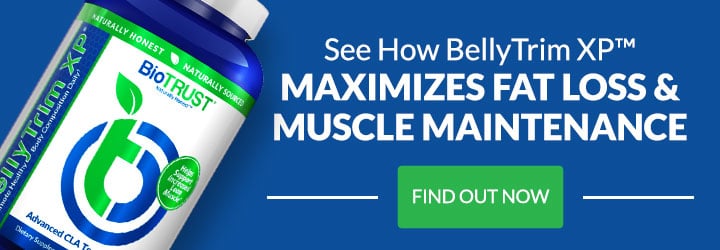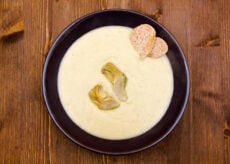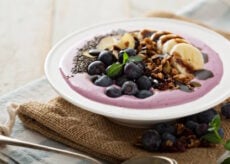Eating Before Bed: Why Everything You’ve Heard is Wrong

How many times have you heard, “Eating before bed will make you fat”? Or, “NEVER eat after 8pm at night or it will just go to your waist and hips”? If you’re like me, you’ve heard it countless times, and every time I do, this is how I feel:

It’s a mystery to me why this myth continues to permeate the Interweb. Of course, restricting food intake to a certain window of time can be an effective weight management tool—it’s called intermittent fasting. And sure, midnight snacking on “junk” is likely going to be a deterrent to your weight-loss goals.
Yet, contrary to popular belief, eating before bed does NOT magically make you gain weight. In fact, eating healthy snacks before bed can help you lose fat, build calorie-burning muscle, recover from exercise faster, and even sleep better. In this article, you’ll learn exactly what foods to eat before bed—and why—to accelerate your health and fitness progress.
Eating Before Bed: What Science Says…
While there are individual differences, randomized scientific trials seem to further contradict the notion that weight gain is inevitable with late-night eating.1 In fact, a crossover study published in the American Journal of Clinical Nutrition showed that healthy men and women who consumed all their calories in a 4-hour window leading up to bedtime lost body fat (4.6 pounds)—compared to NO fat loss when they spread out their calories over 3 meals per day.2
In reality, when it comes to weight management, if food choices and portion sizes are constant, when you eat doesn’t make a big difference for most people most of the time. That is, if you consistently make good food choices in the appropriate amounts—for your goals, activity levels, and physiology (e.g., insulin sensitivity)—it’s perfectly fine eating before bed.
Even more, a late-night snack consisting of the right foods may help you stick to your nutrition plan, sleep better, recover faster, and even improve body composition. Having said all that, naturally you might ask, “What should you be eating before bed?” Excellent question, my friend; here are some helpful guidelines and recommendations.
Focus on Protein, Particularly Slow-Digesting Sources
Protein-rich foods are the centerpiece of the ultimate pre-bed meal. In general, high-protein diets have been shown to be highly effective for improving body composition, promoting overall health, and supporting a healthy metabolism.3–5 What’s more, high-protein meals boost satiety, which means they help keep you feeling full and satisfied.6 After all, who likes going to bed feeling hungry?
Not only that, consuming 20 – 40 grams of slow-digesting proteins (e.g., casein protein, which comes from milk) prior to sleep has been shown to boost recovery from exercise and lead to greater gains in calorie-burning muscle and strength over time.7–9
Here are some of my top protein choices for nighttime:
- Greek yogurt (good source of casein)
- Cottage cheese (good source of casein)
- Milk-based protein supplement that includes micellar casein
- Eggs
Get Low, Low, Low—Low Energy Density, That Is
While most people get hung up on the calorie content of food, it’s the volume of food you consume that may be the most important factor that makes you feel full and stop eating.10 Along those lines, energy density is defined as the relationship of calories to the weight of food (i.e., calories per gram), and low-energy-dense foods (LEDF) are those that contain very few calories per weight/volume of food (i.e., 0.0 – 1.5 calories per gram, by weight).
Research shows that diets rich in LEDF, which tend to have high water and fiber content, promote satiety, reduce hunger, decrease overall calorie intake, and promote weight loss. Foods rich in LEDF are some of the best eating before bed options. By definition, that’s eating more (overall food) while eating less (calories): BINGO!
Virtually all vegetables and most fruits are LEDF; here are some of my favorites that make the cut for nighttime feeding:
- Cruciferous vegetables
- Broccoli
- Kale
- Cauliflower
- Brussels Sprouts
- Cabbage
- Arugula
- Spinach
- Berries
- Cherries
- Kiwifruit
Added bonus: both cherries and kiwifruit have been shown to promote more restful sleep, making them even more appropriate foods to eat before bed.11,12
Add Some Healthy Fats
Healthy fat is also a good addition to your pre-bed meal. On one hand, fats can help slow the rate of gastric emptying, and when combined with carbohydrates, fat may help reduce the glycemic response of the meal (i.e., how quickly carbohydrates appear in the bloodstream).13,14
In general, healthy fats help increase satiety by stimulating the release of hunger-suppressing hormones.15 What’s more, combining fat with fiber-rich foods—like any of the LEDF above—has been shown to further increase the satiating potential of fat.16
Here are some of my top eating before bed healthy fats:
- Avocados
- Coconut oil
- Mixed nuts
- Seeds
Putting all the Pieces Together
**BOOM!** What was that? It was the sound of another myth busted, that’s what! The take-home point is that consuming the right foods in the right amounts at nighttime will not inherently lead to fat gain. In fact, the opposite is quite possibly a greater reality, as a balanced diet rich in high-quality protein, fiber-rich foods, and healthy fats can help improve appetite control and satiety, promote fat loss, optimize health, boost body composition, increase calorie-burning muscle, and improve strength and recovery.
Here are a few examples of my favorite nighttime snacks:
- Greek yogurt with mixed nuts and kiwifruit
- Cottage cheese with pumpkin seeds and cherries
- A BioTrust Low Carb smoothie with coconut oil, spinach, and berries
- A spinach, kale, and arugula salad topped with avocado and hard-boiled egg
I don’t know about you, but all this food talk is making me hungry!
Now, if you happened to get the sage advice of not eating before bed from friends or family, take a moment to share this with them by text, email, or social media simply by clicking the links below. Also, I’d love for you to take a moment to comment below and share your feedback. Help us get America healthy!







